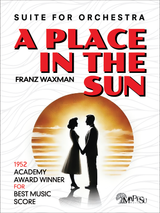
Sunset Boulevard was nominated for eleven Oscars, winning 3 of them, for Best Screenplay, Best Art Direction and Waxman's score for Best Scoring of a Dramatic or Comedy Picture. In 2005, Waxman’s score was listed as among the twenty-five most memorable film scores of all time by the American Film Institute.
Director Billy Wilder (1906-2002) had an especially cynical view of Hollywood, and his screenplay for Sunset Blvd. (co-written with longtime partner Charles Brackett and ex-journalist D. M. Marshman Jr.) is certainly one of the nastiest looks at the movie business ever produced. While many in Hollywood applauded Wilder’s shockingly candid take on the darker side of Tinseltown, others – notably MGM’s L. B. Mayer, who stomped out of a screening – were furious with the film.
It is essentially told in flashback by struggling screenwriter Joe Gillis (played in the film by William Holden), who at the beginning of the film has just been murdered by his lover Norma Desmond (Gloria Swanson, in what many today consider the greatest role of her career), a once-famous silent-film star who lives in a ruined old mansion on Sunset and imagines herself on the verge of a comeback. Her protective butler Max turns out to be the director who long ago made her a star (and, in a brilliant casting stroke, is played in the film by legendary director Erich von Stroheim).
Waxman’s score is largely based on three themes that are subject to development and variation throughout: Norma’s theme, a slightly off-kilter tango that suggests both her 1920s popularity and her increasingly demented mind; Joe’s music, a jazzy, nonchalant motif that conveys his breezy attitude; and what might be characterized as the “love theme” for Gillis and his screenwriter-partner Betty (Nancy Olson), in reality a clever transformation of Paramount’s newsreel march, “The Eyes and Ears of the World,” into a lyrical piece heard to greatest advantage as the couple strolls at night on the studio backlot.
In addition to his considerable work as a composer for the cinema, Waxman wrote for the concert hall (including an oratorio, Joshua, and a song cycle, The Song of Terezin) and was an important part of the cultural life of Los Angeles. In 1947, he founded the Los Angeles Music Festival, which over two decades offered the West Coast premieres of dozens of works, including Stravinsky’s Histoire du soldat, Mahler’s Symphony No. 9, and Britten’s War Requiem.
Waxman's acclaimed version of Carmen's Fantasie is available here.
- Difficulty:
- Advanced
- Instrumentation:
- 2Fl(2dPicc,1dAltFl), Ob d.EH, 3Cl(1d AltSax(opt), 1d EbCl, 1d Bcl), 2Bsn 1dCbsn, 4Hn(4th opt), 3Tpt, 3Tbn, Tba, Timp, Perc(3), Pno d.Cel, Hp, Strings
- Duration:
- 8 minutes
- Set of Parts:
- Includes Strings count 5.5.4.4.3
- Extra Strings:
- Only available with the purchase of the Set of Parts






